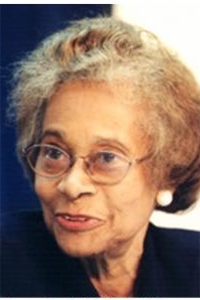
Professor Lucille Mathurin Mair

Lucille Mathurin Mair nee Walrond was born in Jamaica in 1924. Described by Professor Edward Baugh as being ‘made of finely tempered steel’, Ambassador Mair possessed unique qualities that contributed to her many successes, academically and diplomatically. Professor Rex Nettleford in his tribute described Mair as a woman with “dignified detachment and a well-cultivated appearance of invincibility and unflappable charm.” For Ambassador Patricia Durrant, “She combined grace, charm, wit, steely determination, independence and open-mindedness…” No doubt these qualities benefited not just her colleagues and those who placed their trust in her, but also her children, having been left a widow for the second time in her 30s. With her determination and grace, Mair single-handedly raised her children, Ambassador Gail Mathurin and sons David and Adrian. In his tribute to his mother, her son Adrian referred to the many joyful and numerous memories that he and his siblings had of a mother who loved them unconditionally.
Dr. Mair pursued a degree in History at the London University, where she graduated with Honours. She later embarked on a PhD in history at the University of the West Indies and made history by being the first person to do a dissertation based on women. Her thesis, “A Historical Study of Women in Jamaica 1655-1844” completed in 1974, forever influenced the research on women and gender and was the foundation for a plethora of other work on the topic.
This pioneering study confronted the invisibility of women in historical scholarship and was the first of its kind to analyse the issue of the various races and classes of women in Jamaica during the period of enslavement, while giving credence to gender as a tool of historical analysis. Mair’s thesis was important in that it did not simply lump women together, but dissected the different racial and class groups, concluding that, in plantation society, black women laboured, brown women served and white women consumed. She was supervised by the first female professor in the University, Elsa Goveia, whose memory Mair was later able to honour by delivering the Elsa Goveia Lecture in 1986. Her seminal thesis, edited by Professors Hilary Beckles and Verene Shepherd was published in 2006 by the University of the West Indies Press.
As a follow-up to her seminal study, Dr. Mair wrote the article ‘The Rebel Woman in the British West Indies During Slavery’ which put on the platform the resistance efforts of the enslaved black woman, forever dispelling the notion of the black woman as a victim. Instead, as in her thesis, Dr. Mair made these women active agents in their liberation and mitigation.
Dr. Lucille Mathurin Mair served the university community as the first warden of Mary Seacole Hall on the Mona campus in the 1950s and 1960s. She also contributed to the development of Women and Development Studies groups, which were formed in 1982 at the University of the West Indies to promote the introduction of Women's Studies courses and programmes within the academy. She was the first regional coordinator for the Project of Cooperation in Teaching, Research and Outreach in Women and Development Studies from 1986-1989 and was a founding member of the Development Alternatives with Women for a New Era (DAWN). Dr. Mair was instrumental in the establishment of the Centres for Gender and Development Studies across the three campuses of the University of the West Indies. Since 1998, the Mona campus has honoured her with the renowned annual Lucille Mathurin Mair Lecture.
Dr. Mair was also renowned as an international diplomatic figure serving as Assistant Secretary-General in the office of the United Nations Secretariat in 1979. She performed the role of Secretary-General of the World Conference on the United Nations Decade for Women in 1980 in Copenhagen, Denmark. From 1981 to 1982, she served as the Secretary-
General’s Advisor to UNICEF on Women’s Development and between 1982 and 1987, she was the Secretary-General of the United Nations Conference on Palestine. In 1982, she was the first woman to hold the title of Under-Secretary-General of the United Nations.
Dr. Mair served locally as an advisor on developing policies, measures and programmes intended to advance the status of its women and fully integrate them in the process of development. She was an advisor on Women’s Affairs and head of the Jamaican Information Service in 1974 and Deputy Head of Jamaica’s Permanent Mission to the United Nations in 1975. Dr. Mair was subsequently appointed as Jamaica’s Ambassador to Cuba.
She was later appointed Senator and Minister of State in the Ministry of Foreign Affairs and in 1992 was the Permanent Representative for Jamaica to the United Nations.
For her outstanding service as a humanitarian, diplomat, scholar and women’s rights activist she was accorded many awards. These included the OAS Women of Distinction Award in 1987 and the national honours of Commander of the Order of Distinction and the Order of Jamaica. She was also conferred with Honorary Doctorates from three universities, the University of the West Indies, the University of Florida and the University of Ulster in Ireland. Also, in 1996, she was the fifth recipient of the CARICOM Triennial Award.
